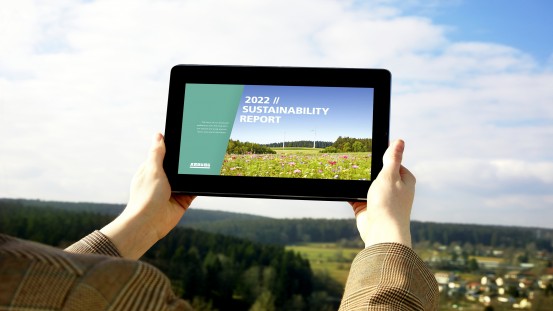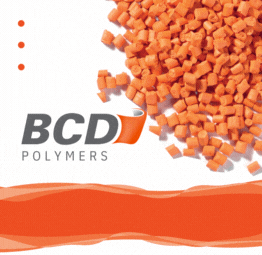In its Sustainability Report 2022, Arburg provides annual information on its website (www.arburg.com/en/smart-production/sustainability/) regarding the values of this family company employing around 3,600 people worldwide and the extent to which it acts and operates sustainably in all relevant areas over the long term.
Part of the arburgGREENworld program
The Sustainability Report is an important component of the arburgGREENworld program, with which the company has enshrined sustainability through resource efficiency, a reduced carbon footprint and circular economy as important goals. These activities already go back more than ten years. As early as 2012, Arburg was one of the first companies ever to be triple certified in terms of quality, environment and energy. Environmental protection, resource conservation and efficiency have been an integral part of the corporate philosophy for decades. Energy-efficient construction is just as much a part of the portfolio as sustainable manufacturing processes. Other contributing factors include central production at a location with a high proportion of in-house manufacturing and short supply chains, production-efficient machine technology, and the digital products and services making up the arburgXworld program (www.arburg.com/en/smart-production/digitalisation/).
Understanding digitalisation and sustainability
An important goal of Arburg is to significantly reduce the carbon footprint in plastics processing through sustainabie production and products. Returning the valuable material plastic sensibly to the cycle is only possible if it is separated by type. Here, Arburg is living up to its claim of combining sustainability and production efficiency through high-quality technology solutions. Reducing emissions, putting finances to good use for Arburg and its employees and understanding digitalisation as sustainability are further central concepts that the company has been incorporating into its activities for some time now. The new Sustainability Report 2022 also has a lot to say about this. One example is sustainable construction: in all the assembly halls built during the last few years, Arburg uses heat recovery to harness the energy input and can therefore heat the buildings in a virtually cost- and carbon-neutral manner. The use of photovoltaics and geothermal energy also enables sustainable energy management. By installing additional photovoltaic systems on the Arburg multi-storey car park in Lossburg and integrating the two wind turbines into the energy generation system, the company is expanding and intensifying its sustainable energy production even more.
Impressive figures
Further impressive figures demonstrate how Arburg has implemented sustainability across the entire company:
- 87 per cent of all waste in 2021 was recycled taking full account of the circular economy.
- Rainwater collected in multiple cisterns increased the share of rainwater in total water consumption from 16 to almost 23 per cent in 2021.
- Arburg generated 1.7 million kWh of solar power with photovoltaics alone for its own use in 2021. This corresponds to the energy needs of around 470 four-person households.
- By participating again in the Carbon Disclosure Project (CDP) 2022 rating, Arburg was able to achieve an above-average result with a "B" rating, as it did in 2021. In addition, EcoVadis and SBTi (Science Based Target Initiative), two further sustainability assessment projects, were added in 2022. Arburg is among the top 25 per cent of companies with an EcoVadis "Silver Score". The SBTi status "Commitment" requires the elaboration of the target path in terms of reduction goals and targets. ARBURG is currently implementing this.
- Between 2010 and 2021, these and many other measures and activities saved a total of over 100 million kilograms of CO2 emissions.
Clearly structured
The conceptual basis of the Sustainability Report is the State of Baden-Württemberg's "WIN Charter" sustainability management system. This "Charta" consists of twelve statements that address, among other topics, human and labour rights, employee well-being, resources, energy and emissions, product responsibility as well as anti-corruption. Another key factor is the added value that a company like Arburg can create for a region. Arburg's third Sustainability Report is an interesting read for anyone wanting to see in black and white what makes the company sustainable and where it is heading in the future in terms of resource conservation.



